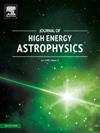f(T) gravity after DESI Baryon acoustic oscillation and DES supernovae 2024 data
IF 10.2
4区 物理与天体物理
Q1 ASTRONOMY & ASTROPHYSICS
引用次数: 0
Abstract
In this work, we investigate new constraints on gravity using the recent Baryon Acoustic Oscillation (BAO) data released by the Dark Energy Spectroscopic Instrument (DESI) and the Type Ia supernovae (SNIa) catalog from the full 5-years of the Dark Energy Survey Supernova Program (DES-SN5YR). The cosmological models considered are characterised by power law late-time accelerated expansion. Our results show that the combination DESI BAO + CMB Planck suggests a Bayesian preference for late-time cosmological models over ΛCDM, obtaining a value of [km/s/Mpc] in agreement with SH0ES collaboration, however, due to a bigger uncertainty.
DESI重子声振荡和DES 2024超新星数据后的f(T)引力
在这项工作中,我们利用暗能量光谱仪(DESI)最近发布的重子声学振荡(BAO)数据和暗能量巡天超新星计划(DES-SN5YR)5年来的Ia型超新星(SNIa)目录,研究了f(T)引力的新约束。所考虑的 f(T) 宇宙学模型具有幂律晚期加速膨胀的特征。我们的结果表明,DESI BAO +rd CMB Planck的组合表明,贝叶斯理论更倾向于晚期f(T)宇宙学模型,而不是ΛCDM,得到的H0=68.3-3.5+3.0 [km/s/Mpc] 值与SH0ES合作的结果一致,但是由于不确定性较大。
本文章由计算机程序翻译,如有差异,请以英文原文为准。
求助全文
约1分钟内获得全文
求助全文
来源期刊

Journal of High Energy Astrophysics
Earth and Planetary Sciences-Space and Planetary Science
CiteScore
9.70
自引率
5.30%
发文量
38
审稿时长
65 days
期刊介绍:
The journal welcomes manuscripts on theoretical models, simulations, and observations of highly energetic astrophysical objects both in our Galaxy and beyond. Among those, black holes at all scales, neutron stars, pulsars and their nebula, binaries, novae and supernovae, their remnants, active galaxies, and clusters are just a few examples. The journal will consider research across the whole electromagnetic spectrum, as well as research using various messengers, such as gravitational waves or neutrinos. Effects of high-energy phenomena on cosmology and star-formation, results from dedicated surveys expanding the knowledge of extreme environments, and astrophysical implications of dark matter are also welcomed topics.
 求助内容:
求助内容: 应助结果提醒方式:
应助结果提醒方式:


